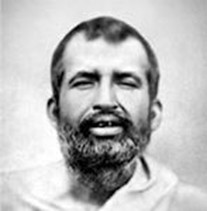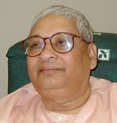Sri Ramakrishna Paramhansa Deva (1836-1886)
 Sri Ramakrishna was born of poor parents at village Kamarpukur in the district of Hooghly of West Bengal. His earlier name was Sri Gadadhar Chattopadhyay. Even in his very childhood, Gadadhar gave on many occasions, a clear evidence of divine inspiration and power through his thoughts and actions. While very young, he felt a keen urge to know if the Divine power of God manifests itself through everything on earth, particularly through the idols or images the Hindus generally worship.
Sri Ramakrishna was born of poor parents at village Kamarpukur in the district of Hooghly of West Bengal. His earlier name was Sri Gadadhar Chattopadhyay. Even in his very childhood, Gadadhar gave on many occasions, a clear evidence of divine inspiration and power through his thoughts and actions. While very young, he felt a keen urge to know if the Divine power of God manifests itself through everything on earth, particularly through the idols or images the Hindus generally worship.
>At the age of seventeen, he was sent to his eldest brother at Kolkata where the latter conducted a Sanskrit academy. On being advised to join studies in keeping with the tradition of the Bramhins, he replied, “Brother, what shall I do with a mere bread winning education? I would rather acquire that wisdom which will illuminate my heart and in getting which, one is satisfied forever.” Thereafter he was engaged as a priest in the Holy temple of Goddess Kali on the bank of the Ganges at Dakshineswar, 8 kilometres off towards the north of Kolkata, a city which was then full of western thoughts and more Europeanized than any other city in India. There he practiced in extreme austerity while performing daily worship in the temple of Kali and ultimately realized that God is the goal of human life and God is the only friend of all beings at all times and under all circumstances. Thereupon he wanted to know the Truth in other religions.
Towards the end of 1866, he got formally initiated into Islam. As a non-Hindu, he began to reside outside the precincts of the temple and started dressing and behaving like a devout Muslim reciting the namaz regularly. In 1874, i.e. after about 8 years, he practiced Christianity imbibing all the teachings of Christ. Thus he tried all beliefs and traversed all different ways one by one. He realized that all the religions are equally true and there are different ways of getting to the truth of existence and everyone has the right to approach God in his or her own way. He said, “A lake has several ghats. At one, the Hindus take water in pitchers and call it “jal”; at another, the Mussalmans take water in leather bags and call it “pani”. At the third, the Christians call it “water”. Can we imagine that it is not “jal”, but only “pani” or “water”? How ridiculous! The substance is one under different names, and everyone is seeking the same substance; only climate, temperament, and name create differences. Let each man follow his own path. If he sincerely and ardently wishes to know God, peace be unto him! He will surely realize Him.’
He expressed in very simple words, with the aid of stories and parables, the great truths he had realized. He was totally free of any dogma and bigotry and emphasized that there could be no claim to monopoly over spiritual matters. Naturally, great scholars and numerous spiritual aspirants, belonging to different sects, with genuine desire for god – realization, were attracted by his wonderful teachings. He did not claim any originality. But with great humility he could keep his audience spellbound for hours together with lucid talks and unfathomable wisdom. During the British rule, education was arranged in such a manner as to turn out men who would be English in taste and intellectual outlook. The shaken Hindu social culture with its spiritual foundation was at a critical juncture when the life and message of Sri Ramakrishna brought fresh strength into the Hindu Society. In fact, from the quiet abode at Dakshineswar he breathed life into Hinduism and ushered in an era of Hindu renaissance.
The great contribution of Sri Ramakrishna to the modern world is the harmony of religions. He preached equal regard for all faiths – “Sarvadharmasadbhava.” He was the embodiment of renunciation and example of the complete conquest of lust and of desire for money. By his life Sri Ramakrishna teaches us that pride and power, wealth and glory, are nothing in comparison with the power of spirit. In fact, he was one of those rare beings, in whom the flame of spiritual life burnt so brightly that all who came near were able to share the illumination. Never before mankind got such a unique personality with synthesis of Jnana, Yoga, Bhakti and Karma.
 +91 7439400724
+91 7439400724 rkvmbkp76@gmail.com
rkvmbkp76@gmail.com


